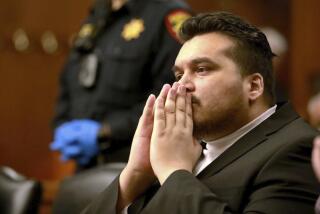After 17 years, three-strikes law is still hotly debated
Scott Andrew Hove tucked a spool of welding wire and work gloves inside his waistband and headed for the Home Depot store’s exit without paying.
As he made his way out of the Lake Elsinore store, employees stopped Hove and found the stolen merchandise hidden under his sweat shirt.
“I was stupid,” the certified welder told them.
The items were worth only $20.94. But the theft cost Hove, 45, a life prison sentence recently, when a Riverside County judge ordered him to spend 29 years to life behind bars under California’s three-strikes law.
His sentence points to the legal debate that continues to rage 17 years after voters approved the law: whether its tough sentences sometimes far exceed the crimes. Unlike other three-strikes laws across the country, California treats any felony as a third strike — even a nonviolent offense such as petty theft or drug possession — as long as an offender’s criminal history includes at least two violent or serious crimes, such as rape, robbery or residential burglary.
Riverside County prosecutors argued that Hove — who has a long history of drugs and thefts, including convictions for residential burglary — had proved himself “an incurable recidivist.” Court records show he managed to avoid the full weight of the three-strikes law at least four times before his latest theft. Among his offenses was a 1996 crash in which he severely injured someone while driving under the influence of methamphetamine.
“He’s your prototypical poster child for three strikes,” said Riverside County Chief Deputy Dist. Atty. Guy Pittman. “How many times does society have to be victimized before we decide to put someone away?”
Hove’s attorney, Deputy Public Defender Jeff Zimel, agreed that his client deserved some time behind bars but argued in court that a sentence of 13 years in prison would be more appropriate. He said that a life sentence was “excessive, outrageous and contrary to the spirit of the three-strikes law.”
Voters overwhelmingly approved the three-strikes law in 1994 amid heightened public anxiety over crime. Supporters say three strikes punishes offenders for what is often a lifetime of crime. The law, which imposes sentences of at least 25 years to life for a third strike, has put thousands of violent criminals behind bars for long stretches.
But it has also produced cases where critics say the punishment was far out of proportion with the crime. Thousands of offenders have been sentenced under the law for third strikes that involve drugs or thefts. Among them was a drug addict whose third strike involved shoplifting nine videotapes to sell for heroin.
Today, most prosecutors are more selective about when they choose to use the law’s full force, but Hove’s sentence illustrates that punishments still can vary from county to county.
In L.A. County, prosecutors follow a written policy that generally seeks potential life terms only when an offender’s most recent crime is violent or serious. By contrast, the Riverside County district attorney’s office examines cases individually. For Hove, the office was once willing to seek reduced sentences but has since run out of patience as his rap sheet has grown longer.
“This guy has received a lot of grace,” said Jennifer E. Walsh, a political science professor at Azusa Pacific University and an expert on three strikes. “We might be looking at more cases like this down the line.”
Hove’s case offers a look at the controversial choices that judges and prosecutors make when deciding how to the apply the law.
Hove grew up in Orange County, the youngest of four children. His father, an imposing figure who weighed more than 300 pounds, abused him physically and verbally, his family said in court records. At one point, the elder Hove choked his 16-year-old son until the boy turned blue, Hove’s mother said.
At school, Hove was diagnosed with a learning disability and took medication for attention deficit-hyperactivity disorder. He showed signs of impulsivity and repeatedly ran into trouble. He was prescribed Ritalin until he was about 12. His mother said she believed her son began using drugs when he came off the medication.
School authorities suspended the young Hove several times for fighting, rule-breaking and drug possession. His first arrest occurred at 13, when he was sent to juvenile hall for shoplifting, drug use and stealing car parts and bicycles, according to a defense psychologist’s report.
Hove told authorities that his addictions to drugs, including crack cocaine and methamphetamine, fueled his thefts. “I’m not a bad person,” he told a probation officer earlier this year. “I have a drug problem.”
In 1991, Hove broke into an office and rooms at a Santa Ana hotel where he had been living. He took VCRs, an answering machine, a radio and other items. He pleaded guilty to three counts of residential burglary and was sentenced to five years in prison.
Once the three-strikes law took effect, each of Hove’s residential burglary convictions counted as a “strike.” He now ran the risk of a possible life sentence if he committed another felony.
But Hove’s crimes continued.
In May 1996, Hove was driving on the wrong side of the road in Chino Hills when he struck a 65-year-old man carrying his grandson, according to an appellate court opinion. The boy was thrown to safety but the crash left his grandfather in a vegetative state, the appeals court said.
Hove tested positive for methamphetamine. He pleaded guilty in San Bernardino County to driving under the influence of a controlled substance and was sentenced to four years in prison.
Hove avoided another potential life sentence in 2001 when he pleaded guilty to possessing marijuana for sale in Riverside County. In 2004, Riverside County prosecutors sought another reduced sentence when he was again charged with possessing drugs for sale.
But when Hove returned to court in 2008 charged with drug possession, Riverside County prosecutors decided he deserved a three-strikes sentence, said Pittman, the chief deputy district attorney. A judge, however, disagreed. Hove was sentenced to two years in prison. He was on parole for that offense when he walked into the Lake Elsinore Home Depot in November 2009.
Armed with Hove’s long criminal record, prosecutors argued that Hove was a career criminal incapable of reforming.
“The defendant has already had enough ‘breaks,’ ” Deputy Dist. Atty. Natalia Matusik wrote in court papers.
A defense psychologist recommended an intense residential drug treatment program rather than prison. He concluded that Hove’s crimes were directly connected to his drug abuse and that Hove used drugs to deal with his untreated mental health problems.
On Aug. 19, Riverside County Superior Court Judge Albert J. Wojcik rejected Hove’s final plea for leniency at his sentencing.
Hove’s mother, Nondus Hove, said she has been dismayed by her son’s frequent legal troubles but believes his sentence is a miscarriage of justice.
“To strike someone out for something like that, it’s ridiculous,” she said.
More to Read
Start your day right
Sign up for Essential California for news, features and recommendations from the L.A. Times and beyond in your inbox six days a week.
You may occasionally receive promotional content from the Los Angeles Times.







